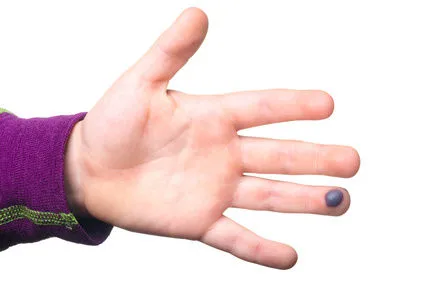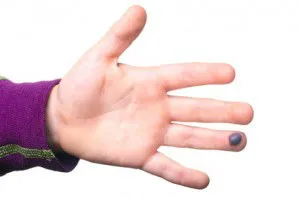
- Share on Facebook24
- Share on Pinterest
- Share on Twitter
They can be unsightly for sure and often rather painful. Blood blisters are minor injuries that happen when the skin is pinched and the surface is not broken. The blood stays confined within the blister at the site of the injury.
Blood blisters are not any different than regular blisters apart from the fact that blood, rather than clear fluid, fills the blister. Although these injuries are not serious and don’t generally require a lot of attention, there are a few things you should know about them so that you know how best to treat them.
Do – elevate the injured location: If you injure yourself – especially if it is your hands or feet – immediately elevating the injury site can prevent you from getting a blood blister in the first place. If nothing else, it will help reduce swelling.
Do – put a cold compress on the site: If you pinch your finger hard enough, it can really hurt. Place a cold compress or an ice bag on the spot until the pain subsides.
Do – cover your blister with a bandage: To keep you from banging the injured site, cover the blood blister with a bandaid. This will keep the blister from bursting open.
Do – clean your wound if the blister pops: If the blister happens to break open, clean it as you would any other injury. Be sure to use an antibacterial lotion or cream after you thoroughly wash the site.
Do – go to the doctor if the area around the blister becomes very painful, swollen or red: This could be a sign of an infection and may require professional care. Always better to be safe and have it checked out by a healthcare practitioner.
Do Not – break the skin around the blister: This is one of the first mistakes that people make when dealing with a blood blister. They want the blister gone so they think that popping it is the answer. If you want the blister to heal without leaving a scar, it is best to leave it alone. Breaking the skin will open up the site and encourage bacteria to enter.
 Do Not – remove the skin around the blister if it pops: If the blister pops on its own it may be tempting to peel away the surrounding skin. However, doing this may injure the skin and open up the blister for infection.
Do Not – remove the skin around the blister if it pops: If the blister pops on its own it may be tempting to peel away the surrounding skin. However, doing this may injure the skin and open up the blister for infection.
-The Alternative Daily
- Share on Facebook24
- Share on Pinterest
- Share on Twitter

